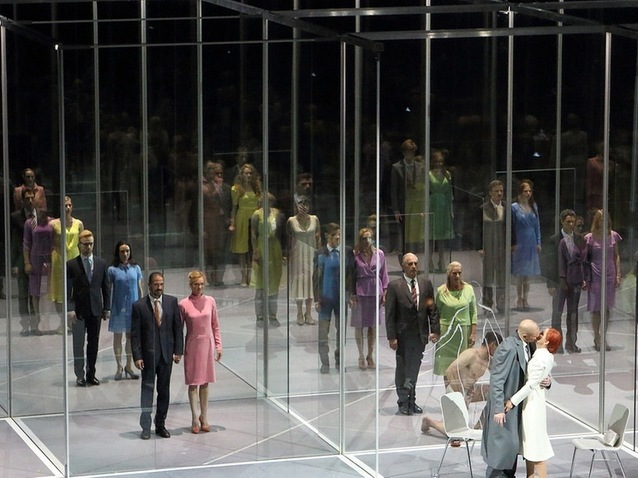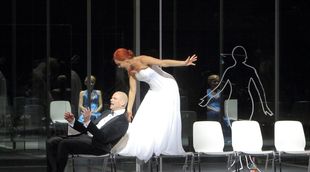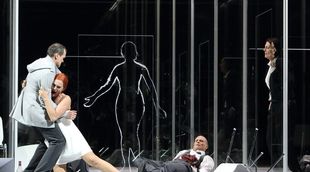
The Bayerische Staatsoper’s new production of Lulu has one focus: the drama. Kirill Petrenko leads the Staatsorchester at a brisk pace that keeps the plot moving. Dmitri Tcherniakov’s stark staging keeps the action on the front of the stage. A cast of committed and talented singing actors make the opera’s bizarre series of events a gripping story.

The stage is a maze of glass. Reflections multiply the characters in all directions, and people watch each other’s follies through the clear panels without being able to interfere. Front and center on a plastic chair sits Lulu. In this role, the magnificent Marlis Petersen captivates with her easy confidence and bright-red hair. Vocally, too, she never falters, navigating Berg’s stratospheric notes and awkward intervals with aplomb. The occasional flat tone is easily forgiven, considering the amount of rolling, fighting, and falling she must do while singing.
Petersen imbues Lulu with such energy that it is easy to understand why so many men are destroyed through her. After her first husband’s sudden, almost-comical heart attack, she marries the painter (sung in a solid tenor voice by Rainer Trost). When he learns the truth behind Lulu’s mysterious past and ongoing infidelities, he appears pressed against her silhouette-glass (the much-discussed portrait) with his throat slit. Lulu then lures Dr. Schön into marrying her. Bo Skovhus brings wonderful dramatic energy to the role and is very expressive in the middle of his range, but he descends into a barely audible croak for his lowest notes.
As Dr. Schön’s wife, Lulu still entertains a bevy of admirers. In the part of the Athlete, Martin Winkler produces a raspy and unpleasant sound but shows off impressive acting skills during his spoken parts. In the trouser role of the young student, Rachael Wilson deploys a clear soprano voice and a touching air of naïve enthusiasm. Lulu’s father / lover Schigolch is interpreted with fitting brusque affection by Pavlo Hunka. As the incestuously infatuated Alwa Schön, Matthias Klink shows off a strong, accurate tenor voice and a wide dramatic range. But the most intense and dedicated of Lulu’s lovers in the Countess Geschwitz, sung with heartbreaking earnestness by Daniela Sindram.

Dr. Schön discovers his wife’s many visitors and insists she commit suicide. But she (somewhat accidentally) shoots him instead. His death is as kitschy as her previous husbands’, with rhythmic, heavy breathing, and then wide eyes and a quick collapse. Lulu goes to jail for the murder. The story of her escape is not narrated in the traditional silent film. Instead, dancers fill the musical interlude with violent displays of seduction, rejection, and intimacy. After Lulu and Alwa run off, they quickly lose their money, and Lulu is reduced to prostitution. Each of her clients parallels one of her husbands (in both idiom and casting). The singer who plays Dr. Schön returns as Lulu’s third and final customer—Jack the Ripper.
But Tcherniakov surprises with his take on the opera’s ending. Jack the Ripper comes to Lulu’s apartment, but he does no killing. Lulu finds his knife and is inspired to stab herself with it. Jack ominously warns Geschwitz that her turn will come soon, but he leaves her alive to embrace Lulu’s corpse. It’s unconventional but appropriate: the strong-willed heroine and her most devoted lover end the opera together, each having decided her destiny.
Lulu is a highly dramatic work, and much of the text is declaimed rather than sung, but the score is still at the heart of the piece. In addition to keeping a good pace, Petrenko and the Staatsorchester do a wonderful job of bringing out the moments of lyricism in Berg’s opera. On Friday night, I often found myself pleasantly surprised by how melodic the music sounded—a credit to Petrenko’s clarity of vision and the instrumentalists’ technical precision.
I make no secret of being wary of Berg, and studying the score of Lulu left me apprehensive about this opera. But the Bayerische Staatsoper’s production far exceeded the recordings I’d seen and left me impressed and moved.
Ilana Walder-Biesanz
the 31 of May, 2015 | Print
Comments